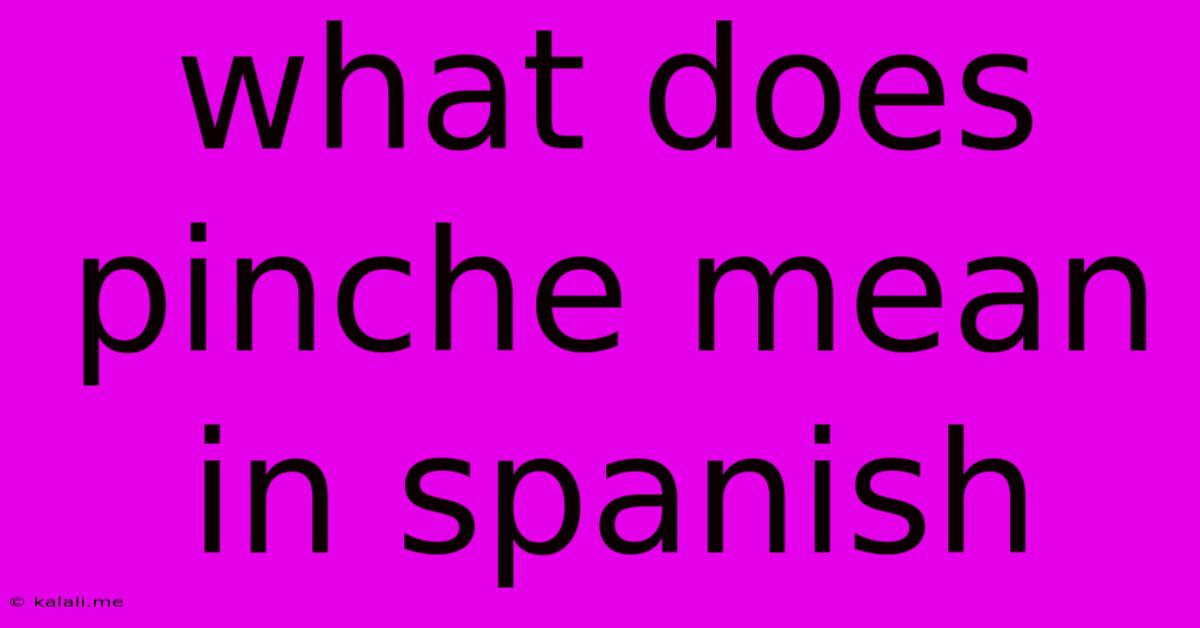What Does Pinche Mean In Spanish
Kalali
May 23, 2025 · 3 min read

Table of Contents
What Does Pinche Mean in Spanish? A Comprehensive Guide
Pinche is a Spanish word with a surprisingly wide range of meanings, depending heavily on context and tone. While it can be a relatively harmless word, it's also frequently used as a vulgar insult. Understanding its nuances is crucial to avoid misinterpretations and potential offense. This article will delve into the various meanings of "pinche," helping you navigate its usage and understand its cultural context.
What is the literal meaning of Pinche?
Literally, pinche translates to "kitchen hand" or "cook's assistant." This is its most innocent and widely accepted meaning. You might encounter this usage in a culinary context, referring to someone who helps prepare food in a restaurant or home. However, this literal meaning is rarely used in modern Spanish.
Pinche as a colloquialism:
Outside of its literal meaning, pinche takes on a much more colorful and often offensive role as a colloquialism. This informal usage is deeply ingrained in Mexican Spanish, but it's also found throughout other Spanish-speaking regions, though with varying degrees of intensity.
Here's a breakdown of its informal meanings:
-
A mild intensifier: Similar to the English words "damn," "freaking," or "bloody," pinche can be used to emphasize a word or phrase. For example, "pinche frío" means "damn cold." The intensity depends heavily on tone and context. It can be used playfully among close friends, but this is not always the case.
-
A general insult: In other contexts, pinche can be a more direct insult, similar to "damn" or "stupid" in English. The offensive nature is more pronounced than when used as an intensifier. The exact level of insult depends on delivery and intonation.
-
Specific derogatory terms: When combined with other words, pinche forms a range of offensive terms. These are often sexually suggestive or extremely vulgar and inappropriate for any context. These combinations are highly offensive and should be avoided completely.
When is it acceptable to use Pinche?
The acceptability of using pinche depends entirely on your relationship with the person you're addressing, your geographical location, and the specific context. Generally:
-
Avoid it in formal settings: Never use pinche in formal conversations, professional environments, or when speaking to strangers or elders.
-
Use caution among acquaintances: Even among acquaintances, using pinche carries a risk of causing offense. It's best to err on the side of caution and avoid it unless you're completely certain of the relationship dynamics.
-
Use it only among close friends (with caution): Among close friends, its use may be acceptable, especially if used as a playful intensifier. However, even then, it's crucial to be mindful of your tone and the potential for misinterpretation.
Alternatives to Pinche:
If you're unsure about the appropriateness of using pinche, many less offensive alternatives exist depending on the context. For emphasis, you could use words like "muy" (very), "increíblemente" (incredibly), or "terriblemente" (terribly). If aiming for a milder insult, "tonto" (silly), "estúpido" (stupid), or "idiota" (idiot) might be more suitable, though still not ideal for polite conversation.
In conclusion: The word pinche in Spanish is complex and multi-faceted. Understanding its various meanings and the contexts in which it's appropriate is key to avoiding misunderstandings and potential offense. When in doubt, it's always best to err on the side of caution and choose a different word.
Latest Posts
Latest Posts
-
How Do You Stop Birds From Flying Into Windows
May 25, 2025
-
How To Remove Rust Stains From Clothes
May 25, 2025
-
How Long Is Chicken Good After Thawed
May 25, 2025
-
How Do You Say Grandfather In Spanish
May 25, 2025
-
How Long Can Gas Sit In A Gas Can
May 25, 2025
Related Post
Thank you for visiting our website which covers about What Does Pinche Mean In Spanish . We hope the information provided has been useful to you. Feel free to contact us if you have any questions or need further assistance. See you next time and don't miss to bookmark.